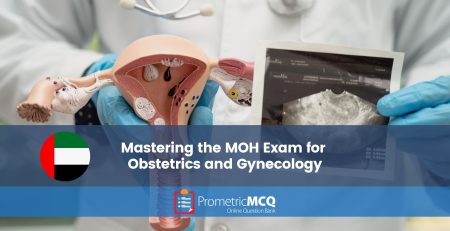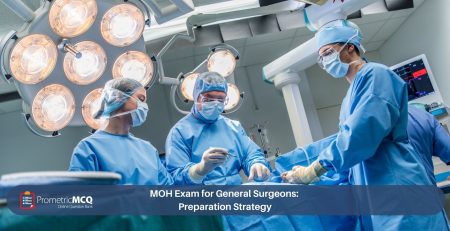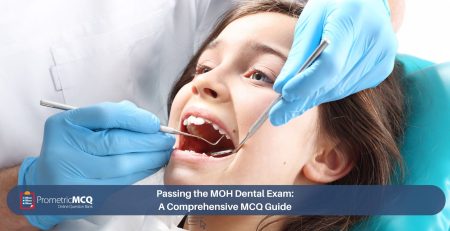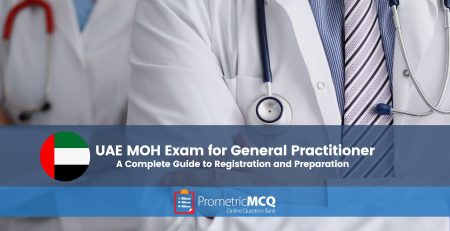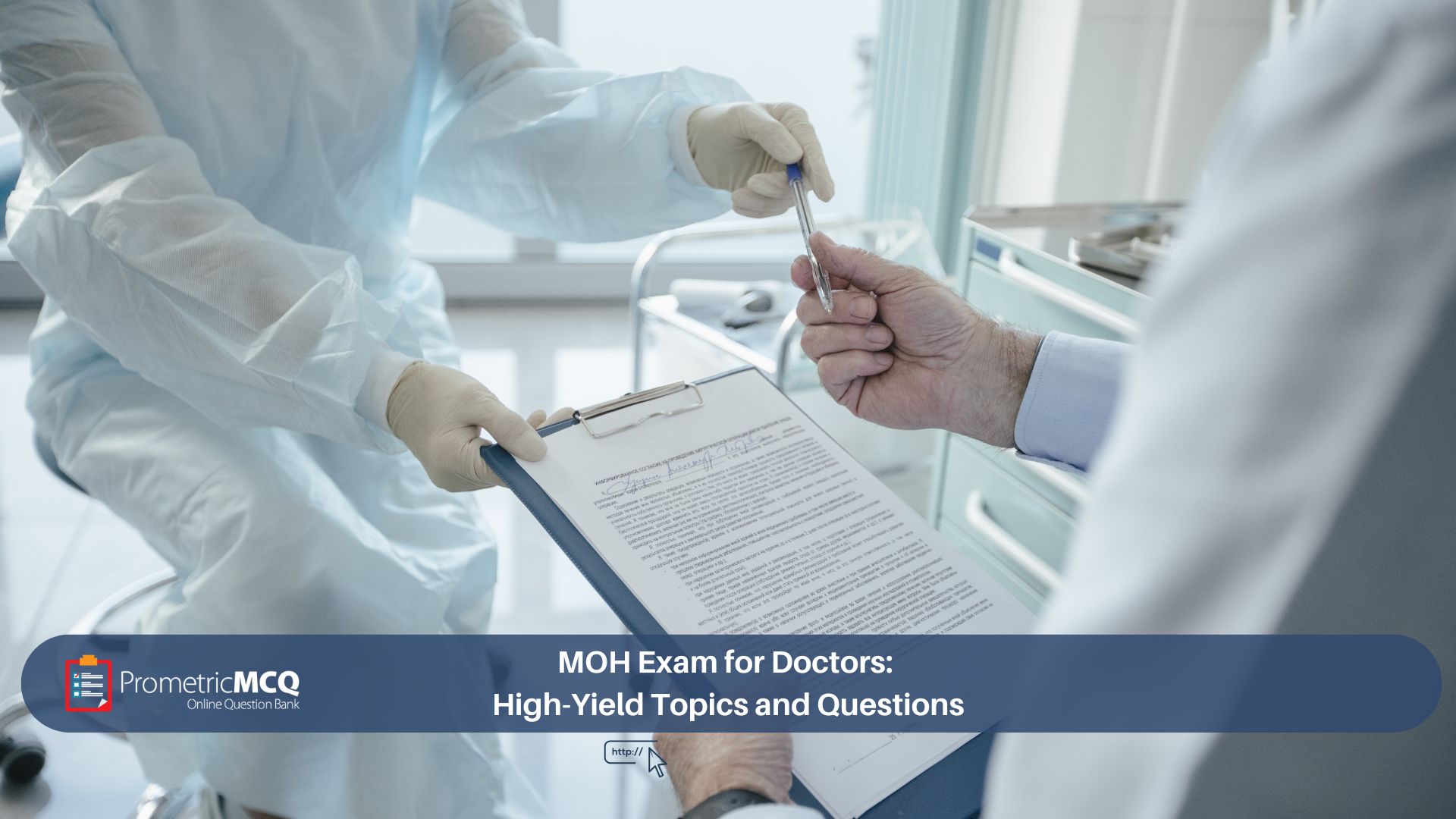
MOH Exam for Doctors: High-Yield Topics and Questions
fatima@prometricmcq.com2025-09-15T14:53:35+00:00Table of Contents
ToggleMOH Exam for Doctors: High-Yield Topics and Questions
For medical doctors aspiring to practice in the UAE’s Northern Emirates, the Ministry of Health and Prevention (MOHAP) exam is the definitive gateway. This comprehensive assessment is more than a test of academic knowledge; it is a rigorous evaluation of a physician’s clinical reasoning, diagnostic skills, and ability to manage a wide spectrum of patient cases according to the highest international standards. Passing this exam is the most critical step toward obtaining your UAE MOH license for doctors.
A common pitfall for many highly qualified doctors is underestimating the specific nature of the MOH exam. Success is not achieved by simply reviewing medical textbooks. It requires a strategic, focused preparation plan that targets the most frequently tested, high-yield topics and familiarizes you with the case-based MCQ format. Understanding what to study is just as important as knowing how to study. This is where a targeted approach, such as our MOH Prometric exam preparation guide, becomes essential.
This ultimate guide is designed to be your blueprint for success on the MOH exam for General Practitioners (GPs) and other common physician specialties. We will provide a deep dive into the most high-yield clinical topics, deconstruct the exam’s question style with detailed examples and rationales, and address your most pressing concerns with a comprehensive 10-point FAQ. Our goal is to equip you with a clear, strategic framework to optimize your study time, build your confidence, and pass the exam on your first attempt.
Key Takeaways for the MOH Doctor Exam
- Internal Medicine is King: This domain forms the backbone of the GP exam. Master the management of chronic diseases like diabetes, hypertension, and asthma.
- Clinical Vignettes Dominate: The exam is almost entirely case-based. Your ability to extract key information from a scenario and make a clinical decision is paramount.
- High-Yield Topics are Predictable: Common presentations in pediatrics, OB/GYN, and emergency medicine are frequently tested. Focus your energy here.
- Aim for 75%+: While the unofficial passing score is around 65%, consistently scoring above 75% in practice tests is the best strategy for a comfortable pass.
- Every Question Counts: There is no negative marking. Answer every question, using educated guesses when necessary.
Deconstructing the MOH Exam Pattern
Before diving into the topics, it’s vital to understand the exam’s architecture. The MOH exam is a computer-based test (CBT) designed to be a standardized and objective measure of your clinical competency.
- Format: Computer-Based Test (CBT) at a Prometric test center.
- Question Type: Exclusively Multiple-Choice Questions (MCQs), almost always with a single best answer out of four options.
- Number of Questions: For GPs, this is typically around 150 questions. For specialists, it can be around 100 questions.
- Duration: Usually 3 hours for the GP exam and 2.5 hours for specialist exams.
- Content Style: Expect clinical vignettes. You will be given a patient’s age, gender, presenting complaint, brief history, and key examination or lab findings. Your task is to select the most likely diagnosis, the best initial investigation, or the most appropriate management.
When you read a case vignette, use a mental checklist: Who is the patient? What is the chief complaint? What are the key positive and negative findings? What are the top 3 differential diagnoses? This structured approach prevents you from being misled by distractors.
High-Yield Topics: The Core of Your Study Plan
The secret to efficient preparation is to focus 80% of your effort on the 20% of topics that are most frequently tested. Below is a breakdown of the highest-yield areas for the MOH GP exam. For more specialized prep, exploring our resources for ENT specialists or Ophthalmologists can be beneficial.
Deep Dive 1: Internal Medicine
This is the most extensive and heavily weighted section. Your performance here is critical.
- Endocrinology: This is a top-tier, high-yield subject. You must be an expert in the diagnosis and management of Diabetes Mellitus (Type 1 and 2). Know the diagnostic criteria, first-line treatments (Metformin), insulin regimens, and management of emergencies like DKA and HHS. Thyroid disorders (hypo- and hyperthyroidism) are also frequently tested.
- Cardiology: Focus on the management of chronic conditions. Master the latest hypertension guidelines (JNC 8/AHA), first-line drug choices, and side effects. Understand the management of stable angina, heart failure (especially recognizing exacerbations), and be able to interpret basic ECGs for acute MI, AFib, and common arrhythmias.
- Pulmonology: Differentiating between Asthma and COPD is a classic exam topic. Know the stepwise management of asthma and the GOLD criteria for COPD. Be prepared for questions on community-acquired pneumonia (CURB-65 score) and tuberculosis.
- Gastroenterology: Common topics include GERD, Peptic Ulcer Disease (especially H. pylori treatment), and irritable bowel syndrome (IBS). Know the red flags that differentiate IBS from inflammatory bowel disease (IBD).
Deep Dive 2: Pediatrics
You are expected to manage common pediatric conditions competently.
- Infectious Diseases: Be prepared for cases of acute otitis media, bronchiolitis, pharyngitis (recognizing strep throat), and gastroenteritis (managing dehydration is key).
- Growth and Development: You must know the key developmental milestones (social, motor, language) for infants and toddlers.
- Immunization: While you don’t need to memorize the entire schedule, be familiar with the major vaccines given in the first year of life and their contraindications.
- Emergencies: Recognize and know the initial management for febrile seizures and anaphylaxis.
Deep Dive 3: Obstetrics & Gynecology
Focus on conditions a GP would manage or need to refer urgently.
- Antenatal Care: Understand the routine investigations and health advice given during pregnancy.
- Pregnancy Complications: Be able to recognize the signs and symptoms of pre-eclampsia, ectopic pregnancy, and placental abruption.
- Common Gynecology: Management of abnormal uterine bleeding, polycystic ovarian syndrome (PCOS), and providing contraceptive advice are high-yield topics.
MOH Exam Sample Questions and Rationales
Theory is one thing; application is another. Let’s analyze some sample questions to see how these topics are tested. A robust QBank like our MOH General Practitioner MCQs is the best tool for this kind of practice.
Question 1: Internal Medicine (Endocrinology)
A 55-year-old man with a 10-year history of type 2 diabetes presents for a routine check-up. His recent HbA1c is 8.5% despite being on metformin 1000 mg twice daily. He has no history of cardiovascular disease or heart failure. His BMI is 32. According to current guidelines, what is the most appropriate next step in his management?
- Add a sulfonylurea like glipizide.
- Add a GLP-1 receptor agonist like liraglutide.
- Add basal insulin at bedtime.
- Advise him to triple his metformin dose.
Correct Answer: B
Rationale: This question tests your knowledge of up-to-date diabetes guidelines. In a patient with type 2 diabetes who is overweight and not at glycemic target on metformin alone, a GLP-1 receptor agonist is a highly preferred second-line agent. GLP-1 agonists (like liraglutide or semaglutide) are effective at lowering HbA1c, have a low risk of hypoglycemia, and, crucially, promote weight loss. Many also have proven cardiovascular benefits, making them an excellent choice.
Why other options are incorrect:
A: Sulfonylureas are effective but are associated with significant risks of hypoglycemia and weight gain, making them less preferred now compared to newer agents.
C: Adding basal insulin is an option, but it’s typically considered later, especially in an overweight patient, as it can cause further weight gain. GLP-1 agonists or SGLT-2 inhibitors are preferred first.
D: The maximum effective dose of metformin is generally 2000-2550 mg per day. Tripling the dose is inappropriate and would cause significant GI side effects.
Question 2: Pediatrics
A 2-year-old boy is brought to your clinic with a 3-day history of a barking cough, low-grade fever, and noisy breathing that is worse at night. On examination, you hear inspiratory stridor. His oxygen saturation is 98% on room air. What is the most appropriate initial treatment?
- Nebulized albuterol
- A single dose of oral dexamethasone
- Intravenous ceftriaxone
- Immediate intubation
Correct Answer: B
Rationale: This is a classic presentation of croup (laryngotracheobronchitis), which is most commonly caused by the parainfluenza virus. The key features are the barking cough and inspiratory stridor. For mild to moderate croup (as in this case, with no signs of respiratory distress), the cornerstone of treatment is a single dose of an oral corticosteroid like dexamethasone. This reduces airway inflammation and swelling, relieving the symptoms.
Why other options are incorrect:
A: Albuterol is a bronchodilator used for bronchospasm (wheezing), as seen in asthma or bronchiolitis. It is not effective for the upper airway inflammation of croup.
C: Antibiotics like ceftriaxone are for bacterial infections. Croup is overwhelmingly viral.
D: Intubation is a last resort for severe croup with impending respiratory failure, which is not indicated in a stable child with normal oxygen saturation.
Frequently Asked Questions (FAQs) for the MOH Doctor Exam
The MOHAP provides a Pass/Fail result and does not disclose a numerical score. However, the widely accepted passing benchmark for the GP exam is around 65%. For specialist exams, it can range from 60% to 70%. Your safest bet is to consistently achieve scores of 75% or higher in practice exams.
While all are Prometric-based MCQ exams testing core medical knowledge, the MOH exam is specific to the UAE (excluding Dubai and Abu Dhabi). The SMLE (Saudi Medical Licensing Exam) has a similar format but is tailored to practice in Saudi Arabia. The QCHP exam is for Qatar. The clinical content is largely universal, but preparation should ideally be done using a question bank specific to the exam you are taking.
For a physician in active practice, a dedicated 2 to 3-month study period is generally recommended. This allows for a thorough review of all the major subjects and sufficient time for extensive MCQ practice (aim for at least 2,500-3,000 questions).
Absolutely. The MOH exam is based on current, internationally accepted, evidence-based guidelines. Knowing the latest recommendations for hypertension (AHA/ACC), diabetes (ADA), COPD (GOLD), and asthma (GINA) is essential. Authoritative sources like the World Health Organization (WHO) publications can provide a global perspective on health standards.
Primary Source Verification (PSV) is a mandatory background check conducted by the DataFlow Group. They verify your credentials (medical degree, license, experience certificates) directly from the issuing institution. You must complete and pass PSV to be eligible for the MOH license, even after passing the exam.
Yes, always. There is no negative marking on the MOH exam. Your score is based solely on the number of correct answers. Therefore, you should never leave a question blank. Use the process of elimination to narrow down the options and then make your best educated guess.
The standard policy allows for three attempts. If a candidate fails three times, they may be required to do additional clinical training before being allowed to re-apply. Always check the official MOHAP website for the most current regulations.
The eligibility letter you receive after passing the MOH exam is typically valid for one year. Within this period, you need to find employment in a healthcare facility in the Northern Emirates, which will then sponsor and activate your MOH license.
In many cases, yes. The UAE health authorities have a system for license transfers. A doctor holding an active MOH license with sufficient experience can often transfer it to a DHA license by fulfilling certain administrative requirements, usually without having to retake the exam. However, this policy is subject to change.
The final week should be focused on review and simulation. Do one or two full-length mock exams under timed conditions to refine your pacing. Quickly review high-yield summaries, formulas, and clinical guidelines. Do not try to learn new, extensive topics. Prioritize rest, nutrition, and stress management to ensure you are in peak condition on exam day.
Conclusion: Charting Your Course to Success
The MOH exam for doctors is a formidable challenge, but it is a predictable one. Its focus on high-yield topics and a standardized, case-based format means that a strategic and disciplined preparation plan is the key to success. By moving beyond passive reading and engaging in active learning with high-quality MCQs, you build not just knowledge, but the clinical reasoning and test-taking skills required to excel. Use this guide as your roadmap, focus your efforts on what truly matters, and you will be well on your way to earning your MOH license and starting a successful medical career in the UAE.
Ready to Test Your Clinical Knowledge Against the Exam Standard?
Our comprehensive question bank for the MOH General Practitioner exam is filled with thousands of realistic clinical vignettes, detailed rationales, and mock exams to ensure you are fully prepared.


